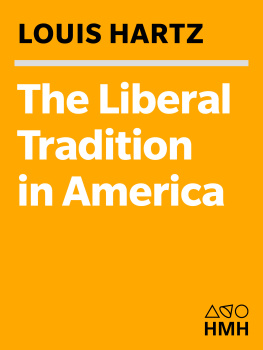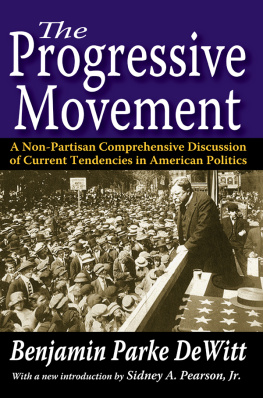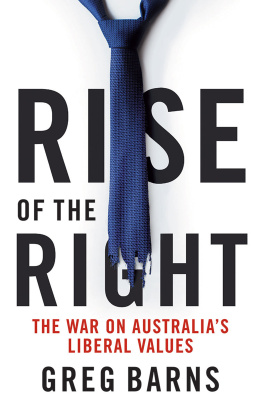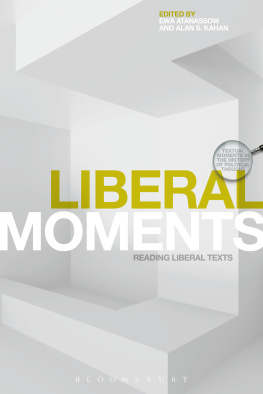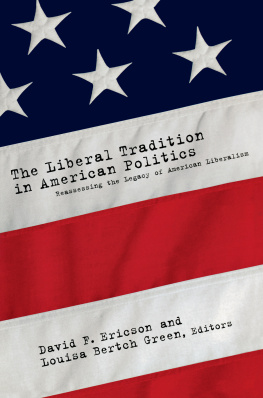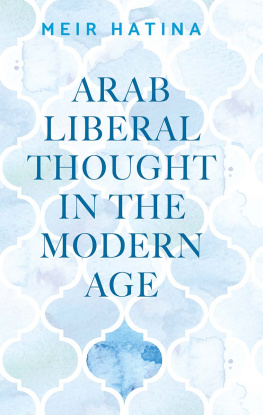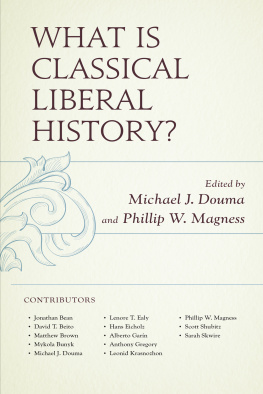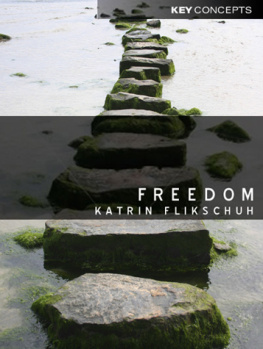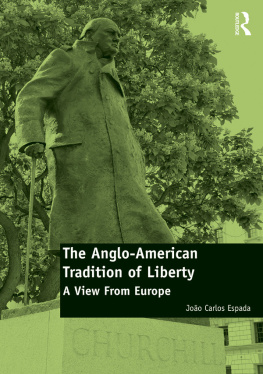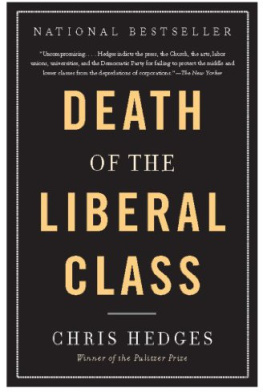Copyright 1955 by Louis Hartz
Copyright renewed 1983 by Louis Hartz
Copyright 1952 by Louis Hartz
Copyright renewed 1980 by Louis Hartz
Introduction copyright 1991 by Tom Wicker
All rights reserved
For information about permission to reproduce selections from this book, write to Permissions, Houghton Mifflin Harcourt Publishing Company, 215 Park Avenue South, New York, New York 10003.
www.hmhco.com
The Library of Congress has cataloged the print edition as follows:
Hartz, Louis, 19191986.
The liberal tradition in America/Louis Hartz: with an introduction by Tom Wicker.
p. cm.
Reprint, with new introd. Originally published: New York: Harcourt, Brace & World, 1955.
Includes bibliographical references and index.
ISBN 978-0-15-651269-5
1. United StatesHistoryPhilosophy. 2. United StatesPolitics and government. 3. LiberalismUnited StatesHistory. I. Title. E175.9.H37 1991 91-11634
973 - dc20
Second Harvest edition 1991
e ISBN 978-0-547-54140-2
v3.0516
Introduction to the 1991 Edition
In contemporary political usage, the term liberal is much confused and abused. Modern Americans tend to believe that liberals favor high taxes and weakened defense in order to pay for Big Brotherly social programs while advocating government regulation of business and too much generosity to minority groups. Actually, that descriptionoverstated in any casenearly inverts the traditional political definition of a liberal.
This new edition of Louis Hartzs classic analysis of American political thought may add to some Americans confusion on the point. The late Dr. Hartz, for many years a professor of government at Harvard University, sticks to the older and more universal meaning, of European origin: his liberalthe American democratis one who believes in individual liberty, equality, and capitalism and who regards the human marketplace, where a person succeeds or fails by his or her own efforts and ability, as the proper testing ground of achievement.
That view of liberalism was more widely understood when Louis Hartz first published this book in 1953 than it is today, owing to Ronald Reagans ascendancy and his followers denunciation of liberals. Even more confounding for those Reaganites may be Dr. Hartzs contention that the United States, from its founding, has been a liberal society in which the liberal tradition has been one of the most powerful absolutisms in the world.
How can that be squared with the plausible claim of the modern political Right that America is a conservative country? Actually, in the historical perspective of this book, the so-called conservative revolution that first brought Barry Goldwater to national prominence, then Ronald Reagan to national power, appears to have been a particularly virulent reassertion of the liberal tradition Dr. Hartz identifies.
He argues persuasively that the liberal tradition in America was the natural consequence of a phenomenon noted by Tocqueville: The great advantage of the Americans is, that they have arrived at a state of democracy without having to endure a democratic revolution; and that they are born equal, instead of becoming so.
America, in other words, was founded by persons who fled the anciens rgimes of Europe to escape various oppressions; therefore such oppressions never really flourished in the new world, and it was not necessary for the early settlers to rebel against and destroy them, as Europeans had had to do. Consequently, America
... lacks a genuine revolutionary tradition... and this being the case, it lacks also a tradition of reaction... and becomes as indifferent to the challenge of socialism in the later era as it was unfamiliar with the heritage of feudalism in the earlier one.
The resulting political homogeneity has meant that Americans generally have followed an American Way, insisting on being let alone to pursue their material fortunes, recoiling from foreign ismsnotably socialism and communismand being freed from class consciousness and antagonism. Consequently they have developed neither an aristocracy nor a revolutionary Left.
Even the New Deal, in the Hartz analysis, was conceived not as a revolutionary doctrine or from any systematic social thought but out of a submerged and absolute liberal faith. It was devised, presented, and seen by most Americans as experimentation and problem solving permissible within that faith. Therefore Herbert Hoover, though hurling liberal abstractions in dissent, was ineffective as a critic of a pragmatic program, many of whose ideas liberal Republicans later were able to adopt. Yet in a time of economic and social crisis, the New Deal was sufficiently radical in practice to satisfy the need for action and to prevent socialism from making political headway against ingrained American liberalism.
The liberal tradition, as portrayed in this challenging book, has its dark side. The basic ethical problem of a liberal society, Dr. Hartz argues, is not the danger of the majority which has been its conscious fear, but the danger of unanimity, which has slumbered unconsciously behind it. This near unanimity of fundamental belief means that when Americans face military and ideological pressure from withoutas they have in contemporary timesthe national response to a threatening heresy is an instinctive closing of ranks that transforms eccentricity into sin and dissent into danger of subversion and betrayal.
Hence, most prominently, the red scares of the 1920s and 1950s, during which, Dr. Hartz tartly observes, the American liberal community contained far fewer radicals than any other Western society, but the hysteria against them was much vaster than anywhere else. (Hence, too, in my view, the more recent assault, as un-American, on what conservativesthe modern legatees of Dr. Hartzs traditional liberalsconsider the heretical goals of what they call liberalism.)
This ideological isolationism of Americans, moreover, has a polar counterpart in the messianism of the traditional American liberal. This remarkable figure, unique in history became of his history, is driven to try to reconstruct according to the American Wavand thus to eliminatethose elements of foreign societies that he most fears in his own:
An absolute national morality is inspired either to withdraw from alien things or to transform them: it cannot live in comfort constantly by their side.
That messianism, by which Americanism, when it does not retreat, goes abroad, perhaps explains the American tendency to depict opponents not merely as such but as evil, as devils deserving of destruction by worthy Americanswitness the demonization, during the Gulf War, of Saddam Hussein.
The messianism of the liberal tradition also dramatizes the underlying unanimity that Louis Hartz believes has been imposed on Americans by that tradition. Have not liberals (as defined in contemporary usage) as well as conservatives been unabashed in their desire to remold other peoples in the American Way? Was that not the pledge of Republican and Democratic administrations alike in establishing and defending South Korea and South Vietnam as putative outposts of democracy, capitalism, and freedom? Did not Reagan war against Nicaragua on the premise that the Sandinistas had not lived up to their democratic promises? George Kennan has pointed out that Americans tend to judge others bv the extent to which they contrive to be like ourselves; Dr. Hartz adds that its all the easier for us to do because we have been so much alike.
But Louis Hartz also argues that people everywhere still depend on America for the assertion of what is best in the liberal traditionthe protection and development of the concept of personality against the power of the state and other monoliths. The appeal of that concept has been dramatically evident in the dissolution of the Soviet empire, and it accounts for what Dr. Hartz considers inherent in American liberalismthe power to transcend its own limitations.
Next page
